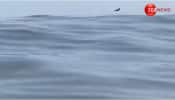 New Delhi: The Central Pollution Control Board (CPCB) has set up a mechanism under its environmental surveillance squad programme to carry out surprise inspections and assessment of pollution levels of industrial units, the Lok Sabha was informed today.
New Delhi: The Central Pollution Control Board (CPCB) has set up a mechanism under its environmental surveillance squad programme to carry out surprise inspections and assessment of pollution levels of industrial units, the Lok Sabha was informed today.
Environment minister Prakash Javadekar told the Lok Sabha in a written reply that based on the inspections, in 2013-14, 201 industries in various states were inspected.
"CPCB has set up a mechanism under its Environmental Surveillance Squad (ESS) programme for carrying out surprise inspections and assessment of levels of pollution of industrial units based on adoption of a uniform approach and elimination of subjectivity in scheduling inspections," he said.
Javadekar said that in addition, the surprise inspections were carried out to check the adequacy of pollution control systems and status of compliance to the prescribed standards by the industries including steel, textile and sugar plants.
He said that based on the inspections, CPCB has issued directions to the defaulting industries under section 5 of Environment (Protection) Act 1986 and to the State Pollution Control Board under section 18(1)(b) of the Water (Prevention and Control of Pollution) Act 1974 and section 18(1)(b) of the Air (Prevention and Control of Pollution) Act, 1981.
The Minister said that out of the total 201 inspections carried in various states in 2013-14, 21 industries were given directions under section 5 while six industries were given directions under section 18 (1)(b).
He said to further strengthen monitoring mechanism for effective compliance through self-regulatory mechanism, directions under section 18(1)(b) of the Water and Air Acts have been issued to all SPCB on February 5, 2014 by CPCB.
To direct all industries which fall under 17 categories of highly polluting industries, common Effluent Treatment plants, common hazardous waste and biomedical Waste Incinerators to install continuous emission and effluent monitoring system by March 31, 2015, Javadekar said.
As per the directions, they have been asked to submit bank guarantee at the rate of 25 per cent of the cost of online monitoring systems for ensuring timely installation of online monitoring systems.
Environment minister Prakash Javadekar said that although state pollution control boards of all coastal states are controlling waste water collection, treatment and disposal to protect flora and fauna, his ministry has laid down the effluent standards under Environment Protection Act 1986 in order to ensure that the industries comply with the standards.
"In addition, a Coastal Aqua Culture Authority has been established under the Coastal Aqua Culture Authority Act 2005 under the ministry of Agriculture to regulate the coastal aquaculture activities with an object to protect coastal environment," he said.
The minister said that a comprehensive legislation has also been enacted under section 3(1) and section 3(2)(v) of the Environment Protection Act 1986 and 5(3)(d) of the Environment Protection Rules 1986 declaring coastal stretches as Coastal Regulation Zone (CRZ) to regulate activities in it.
Replying to another question, he said that National River Conservation Plan (NRCP) and National Ganga River Basin Authority (NGRBA) presently cover 48 polluted stretches of 42 rivers in 199 towns spread over 21 states at a sanctioned cost of Rs 10716.45 crore.
Till end of March 2014, Rs 5097.50 crore has been released to state governments for implementation of various pollution abatement schemes and sewage treatment capacity of 4957.98 million litres per day as been created so far under the two programmes, the minister said.
He said that in order to identify polluted and degraded lakes, a study was carried out on the instance of Planning Commission in 2003 and 62 lakes were identified which required conservation and restoration.
He said that the National Lake Conservation Plan (NLCP) covers 62 lakes in 14 states sanctioned at a total cost of Rs 1041.96 crore. An amount of Rs 573.873 crore has been released till March 2014 for implementation of projects under NLCP.
The National Wetlands Conservation programme (NWCP) has also been implemented by the ministry under which financial assistance amounting to Rs 133.64 crore has been provided till March 2014 for conservation of 80 identified wetlands.
He said that to avoid overlap and promote better synergies, NLCP has been merged in February 2013 with NWCP into one integrated scheme National Plan for Conservation of Aquatic Eco-Systems (NPCA), the minister said.















